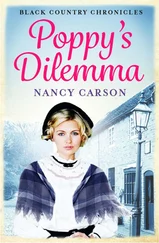Of course, the Spencers were not so well off that Mrs Spencer had a lady’s maid, so Daisy carried hot water upstairs so they could wash. She worked in the kitchen with the cook and got to know her routine. By the time she was twenty, she was the head maid and earning £15 a year.
Meanwhile, Titus got no better and had to give up work entirely. He was beginning to lose weight, which he could ill afford to do. Mary applied for parish relief. It was always a struggle to find money for coal, for rent and for food. Daisy tried to borrow money to pay the doctor to treat her father, but realised she had no chance of paying it back, so gave up the idea.
Sarah, by this time had, left school and found work in service. Unfortunately, the family she worked for were not kind to her and she hated her job. Yet she stuck it out, concerned only that she give money to her mother to help keep them.
They all struggled through for a couple of years. Dr McCaskie was sent for again and he warned that Titus might be consumptive. Then, Daisy had a spot of good fortune. Again, through somebody she had got to know at church, she was asked if she would be interested in the position of housekeeper at a place called Baxter House on the rural north-western side of Dudley. The house was named after Richard Baxter, a long-departed headmaster at the grammar school, famed for having written the words to the hymn, ‘Ye Holy Angels Bright’. Baxter House was the home of Mr Jeremiah Cookson. Daisy had seen Mr Cookson before, as he was a business friend of Mr Spencer. She had also occasionally spoken to his wife in the course of her duties, as the couple were visitors to the Spencer household. Her wages were to be £60 a year, a goodly amount. Daisy found it impossible to resist when she realised how much easier it would be to help support her mother and father and pay for the doctor and medical treatment. Naturally, she was grateful to accept the position. She could scarcely believe that she was to become a fully-fledged housekeeper at only twenty-two years of age. When she went with trepidation and mounting guilt to see Mrs Spencer to terminate her employment, the lady of the house smiled benignly.
‘Oh, don’t worry, Daisy,’ she said. ‘Mr Cookson asked Mr Spencer a while ago for permission to approach you. He and his wife have had their eye on you for some time. They said how much they admire your demeanour and your application to your work.’
Daisy bobbed a curtsy. ‘Thank you, ma’am. I had no idea you’d talked about me.’
‘It’s a grand opportunity for you, Daisy, and you deserve it. Far be it from me to hold you back from finer things. I also understand the difficulties you face with your father unable to work any more. It must be a big worry for your poor mother. This new position means you’ll be of greater help to her too, I imagine.’
‘Oh, yes, ma’am. I already hand over all my wages to my mother. I only want for decent shoes and stockings and she gives me money back to buy those as and when.’
Mrs Spencer smiled sympathetically and touched Daisy’s arm. ‘We shall miss you, my dear. But we shall manage, I daresay. Come and see us whenever you have the time. You will always be welcome.’
Daisy tried hard to stem the tears that were welling up in her eyes but, rather than let them show, she swiftly thanked Mrs Spencer for her kindness and curtsied again before she turned and walked away. When she was out of sight she pulled her handkerchief from her sleeve and wiped the tears that, by now, were streaming down her face. She had been happy at the Spencers’ and they had been so kind. She vowed never to forget their kindness.
On 25th May 1888, a week after her twenty-second birthday, Daisy moved to Baxter House, a fine modern mansion built of red brick. The household was appropriately large too, with many more servants than there were at the Spencers’ more modest dwelling. Baxter House was set back from St James’s Road, close to where it joined Ednam Road, and overlooked green meadows and grazing cattle. No doubt Mr Cookson preferred it to overlooking the dirty, grey, slag-heaped outlook on the other side of the town. He was immensely rich and spent lavishly. It was said that he employed three hundred men at his iron foundry in Dudley, and had recently invested a great deal of money building a railway siding at the works.
Some of the maids at Baxter House were older than Daisy and at first she sensed some resentment that they should be told what to do and be given tasks by a girl so much younger. Yet she succeeded in earning their respect. She was never haughty to them, but gave them their jobs as if making a request and with an open smile to which they always responded positively. In so many big houses, girls were unhappy, often abused and sometimes even beaten. The staff of Baxter House were thankful they were well treated and appreciated. Nobody ever took it upon herself to rebel and make things uncomfortable for everybody else.
As soon as there was a vacancy for a maid Daisy recruited Sarah, her sister. She was fourteen by that time and a good, reliable worker, although not as bright as Daisy. Daisy even managed to secure her an increase on what she had been earning but Sarah would have come for less, glad to get away from that house in Holly Hall. Sarah settled in promisingly and Daisy was happy to have her under her wing. Most nights Sarah would go to Daisy’s little room on the top floor, where they would talk until the small hours, before returning to the room she shared with Hannah Bissell, a kitchen maid the same age as her.
‘Have you got a sweetheart?’ Sarah asked one night as she lay sprawled across Daisy’s legs.
Daisy was sitting up in bed attending to her fingernails. ‘You know I haven’t,’ she replied. ‘Have you?’
Sarah smiled bashfully and shook her head. ‘Have you ever had a sweetheart, Daisy?’
‘Once,’ she answered honestly. ‘For a while. His name was Charlie Bills. He was the baker’s boy when I worked at the Spencers’.’
‘Did you love him?’
‘I suppose I did. At first, at any rate. Leastwise, he made me feel all soppy.’
‘Did you let him kiss you?’
‘Yes, sometimes.’
‘Is it nice to be kissed by a boy?’
Daisy smiled patiently. ‘I think that might depend on the boy – and on how much you like him.’
‘Would you like a sweetheart again?’ Sarah enquired after listening carefully to Daisy’s answers.
‘If somebody came along who I fancied.’
‘Tell me the kind of man you fancy,’ Sarah said dreamily.
‘Oh, I have a vivid picture of my ideal husband in my mind’s eye,’ Daisy told her, and Sarah’s beautiful clear eyes flickered with interest. She sat up on the bed attentively, her back erect, her legs crossed under her cotton nightgown. ‘He’s very handsome with dark, wavy hair and kind, smiling eyes. He’s quite tall, with a straight back, not given to slouching … He’s clever, amusing, and good at making interesting conversation.’
‘Ooh, yes,’ Sarah enthused. ‘You don’t want some duffer who can’t keep up a decent chat, do you? And will he be rich, Daisy?’
‘Rich enough. Rich enough to afford our own servants.’
‘What about Mr Robert then?’
‘Mr Robert?’ she said with a shudder. ‘Are you serious? I can’t stand Mr Robert.’ Mr Robert was the middle son of Jeremiah Cookson of Baxter House. Unmarried, he still lived there. Daisy had already noticed the way Mr Robert looked at her. If he had designs on her, though, he could forget it.
‘He’s got a handsome friend,’ Sarah said, her long eyelashes veiling her eyes. ‘I wish I was a bit older.’
‘Oh? And what’s his name, this handsome friend of Mr Robert?’
Sarah sighed and picked a stray piece of cotton from her nightdress. ‘I dunno …’ There followed an introspective pause. ‘Anyway,’ she said eventually, ‘how are you going to meet somebody that rich, who’ll stoop to marry you ?’
Читать дальше












